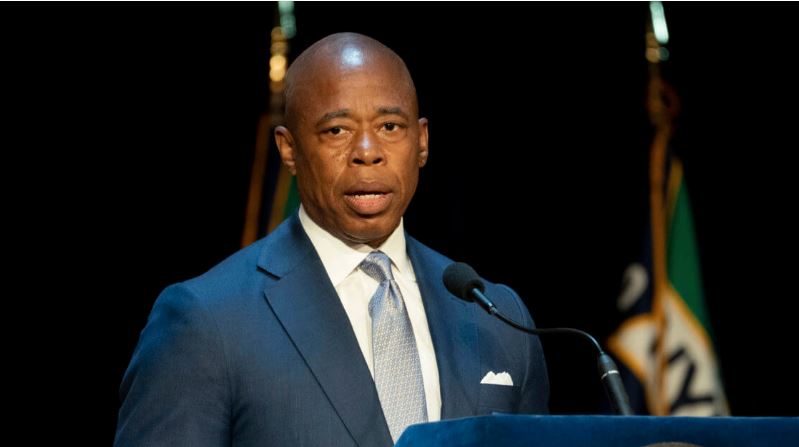NEWYORK: New York city Mayor Eric Adams signed several pieces of legislation to help build critically-needed housing and address infrastructure concerns regarding sewers and flood prevention.
Today’s bill signings come after the passage of Mayor Adams’ “City of Yes for Housing opportunity” proposal, the most pro-housing zoning proposal in New York city history.
The City of Yes proposal alone exceeds all the housing created from rezonings during any mayoral administration of the last 50 years, including all of the 12 years of the Bloomberg administration and all eight years of the de Blasio administration.
“‘City of Yes for Housing Opportunity’ is a watershed moment in our city history,” said Mayor Adams.
“Thanks to our partnership with Governor Hochul, Speaker Adams, and the New York City Council, our city met the moment in front of us, passing legislation that will allow us to build 80,000 new homes while investing $5 billion in critically-needed infrastructure and housing. Today’s bill signing is another step in the right direction, but our work is far from over. Our administration will continue the work of fighting for more affordable housing, providing stable housing to our unhoused neighbors in need, and bringing the American Dream of owning a home closer to reality for more New Yorkers.”
“With Mayor Adams signing the ‘City of Yes for Housing Opportunity’ legislative package into law, today marks a new chapter in our city’s effort to ensure every New Yorker has a safe and affordable home,” said First Deputy Mayor Maria Torres-Springer.
“Thanks to Mayor Adams’ leadership and our partnership with Governor Hochul, Speaker Adams, and the City Council, we took decisive action to deliver affordability for hard-working New Yorkers. We are also investing $5 billion to strengthen our infrastructure, protect tenants, and bolster our ability to finance affordable housing across the five boroughs. Thank you to all who stood alongside us to say ‘yes’ to ‘City of Yes.'”
“Planning for 80,000 more homes in New York must be done smartly — accounting for the infrastructure that turns units into complete communities,” said Deputy Mayor for Operations Meera Joshi.
“The professionals at DOT, DEP, DOB, and Parks are stepping up to add critical infrastructure and community character to protect and shape neighborhoods for future generations. Today, as Mayor Adams signs these bills, we do just that.”
“As the chair of the Committee on Land Use for the last seven years, I have had the privilege of overseeing the approval of well over 100,000 units of new housing across New York City,” said Councilmember Salamanca.
“In my district alone, I’ve approved over 10,000 units of 100 percent affordable housing. Unfortunately, there is a sad reality. Despite the lengthy negotiations it takes to approve a project, it often takes years for HPD to provide the necessary project funding to facilitate a development’s groundbreaking, delaying much-needed housing in the process. This lack of transparency is why I introduced Intro. 850-A, which would require HPD to report biannually when projects can expect to receive financing as part of the agency’s twice-a-year closing period. If a project does not close within a targeted closing cycle, HPD would be required to report the reasoning, and when a new closing date can be expected. Mandating this information to be public is an important step in understanding how the city prioritizes the development of housing across New York City.”
“New Yorkers deserve bold action to access dignified, affordable housing — something the ‘City of Yes’ with Council’s ‘City for All’ plan can together achieve,” said Councilmember Sanchez.
“While rezoning is a critical piece to addressing the housing crisis, the Council recognized more was needed to turn the tide and negotiated in good faith with the administration to secure $5 billion in critical additional investments that are rooted in principles of housing justice and comprehensive planning. I am proud to have introduced and led three important pieces of legislation that will be signed into law by Mayor Adams as part of the ‘City of Yes’ package. Intros. 1127-A and 1128-A will provide the necessary building code updates to ensure ADUs are safe for existing and future residents. Intro. 654-A re-establishes the J-51 tax incentive — a critical preservation tool that offsets improvement costs for low-to-moderate cost residential buildings, including for 166,000 families living in co-ops citywide. This iteration of J-51 includes added tenant protections, prioritization of energy efficiency work to meet our city’s climate goals, and data transparency to understand the full reach of the program. Together, these bills mark a crucial step toward preserving and creating safe, affordable housing options throughout New York City.”
“I am proud to be here for the bill signing of Intro. 814-A and Intro. 815-B — two lifesaving bills I authored that will provide a comprehensive framework for building a safer and more resilient New York City,” said Councilmember Gennaro.
“Intro. 814-A requires the DEP to update its plan to prevent sewer backups at least once every five years and alert residents when it determines that a sewer backup may have been caused by an issue in a privately-owned sewer. This bill will reduce the frequency of sewer backups, saving New Yorkers from costly damage to their homes and exposure to raw sewage. Intro. 815-B creates a special designation for ‘inland flood hazard areas’ — a measure that is long overdue. This bill provides the tools and data we need to protect New Yorkers in areas outside traditional flood zones. By mapping inland flood hazards, we enable smarter planning and more effective emergency responses. Intro. 815-B also creates a coastal flood risk map that, unlike FEMA flood maps, anticipates the impact of sea level rise. As extreme weather becomes more frequent, we must increase our city’s resilience to flooding from coastal storm surge and rainfall. This bill helps to achieve that goal.”
“For decades, we simply have not built enough housing to keep up with demand. Without enough homes to house the people who live here, we have seen rents soar, vacancy rates plummet, and opportunity decline,” said New York City Councilmember Keith Powers.
“With today’s signing of ‘City of Yes,’ we are becoming a city of tomorrow, instead of a city of yesterday.”
“New Yorkers deserve bold leadership that meets the challenge of our affordability crisis, and the ‘City of Yes’ housing plan will help build a significant amount of new homes across the city,” said New York City Councilmember Carlina Rivera.
“I commend Mayor Eric Adams, Speaker Adrienne Adams, and city leadership for securing historic investments in capital, infrastructure, public housing, tenant protections, and more, to expand on proposed zoning changes that will create opportunity and stronger neighborhoods.”



